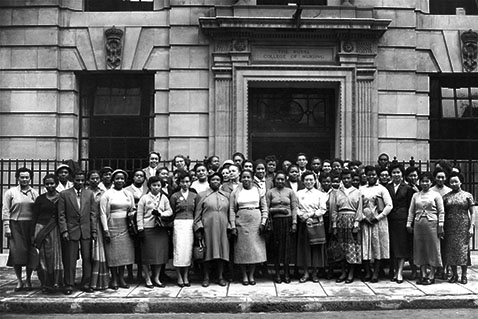Our history
For over 100 years, the Royal College of Nursing has been supporting nurses and promoting the vital importance of nursing staff. We are proud to have evolved into both a trade union and a professional body during that time.
 We began as the College of Nursing in 1916, a professional organisation with just 34 members and within three short years had secured our first parliamentary success. The Nurses’ Act was passed and the first ever nurses’ register created, meaning the public could now be confident that their newly registered nurses were trained to a professional standard.
We began as the College of Nursing in 1916, a professional organisation with just 34 members and within three short years had secured our first parliamentary success. The Nurses’ Act was passed and the first ever nurses’ register created, meaning the public could now be confident that their newly registered nurses were trained to a professional standard.
From there, the RCN grew from strength to strength, gaining a Royal Charter in 1928 and by the outbreak of the Second World War our membership had grown to 30,000. In 1939, King George VI conferred the title ‘Royal’ on the RCN and we played a vital role in ensuring the supply of nurses through the war Emergency Committee.
Today, we are honoured to be the largest professional association and union for nursing staff in the world.
1916 - 17
College of Nursing Ltd founded with 34 members. Scottish Board established in Edinburgh. Irish Board established in Dublin.
1919
Following a successful College of Nursing campaign, the Nurses' Act is passed establishing a register for nurses for the first time.
1926
Decision taken to close Irish Board, but the Belfast centre is unaffected. Queen Mary becomes official patron.
1928
Royal Charter granted to the College.
1939
George VI grants the title "Royal" to the College, which now has 30,000 members. War Emergency Committee established for duration of WW2.
1944
Princess Elizabeth accepts position of President of the Student Nurses Association.
1960
Membership opened to all registered nurses including men.
1962
Welsh Board established.
1963
Change of name as the RCN amalgamates with the National Council of Nurses to become the Royal College of Nursing and the National Council of Nurses of the UK (RCN). International Department established.
1964
Northern Irish Committee becomes a Board.
1967
Membership records are computerised.
1968
Membership opened to nursing students.
1969
Welfare Advisory Service established. Raise the Roof campaign to increase nurses' pay.
1976
RCN registers as a Trade Union.
1992
Nurse prescribing became law following a concerted RCN campaign.
1995
The RCN changed its rules to allow industrial action which does not harm patients.
1998
The RCN launches RCN Direct, its 24-hour information and advice service.
2001
Health care assistants admitted into membership for the first time. The RCN establishes nine English regional boards.
2002
The online Learning Zone is launched, offering members flexible, bite-sized learning resources available 24-hours a day.
2009
The RCN is accredited by Investors in People.
2010
The RCN ceases to be a charity and the independent RCN Foundation charity is set up to support nursing and improve the health and wellbeing of the public. Frontline First campaign is launched to highlight cuts to nursing posts.
2011
The RCN makes its debut in the celebrated Sunday Times Top 100 employers list, receives two star accreditation from Best Companies and launches its health and wellbeing programme for staff.
2012
The RCN is awarded the prestigious Investors in People gold standard and launches its This is nursing campaign to celebrate the positive work of the UK's nursing staff.
2013
The RCN is awarded the Royal Society for Public Health's Health & Wellbeing Award for our UK-wide workplace Health and Wellbeing Programme.
2014
The What if...? campaign is launched to fight for members' pay and conditions.
2015
The RCN maintains a place within the Sunday Times list of the Top 100 best not-for-profit employers and its two star accreditation from Best Companies.
2016
The RCN celebrates 100 years of pioneering professional standards, shaping health policies and promoting excellence in practice.
